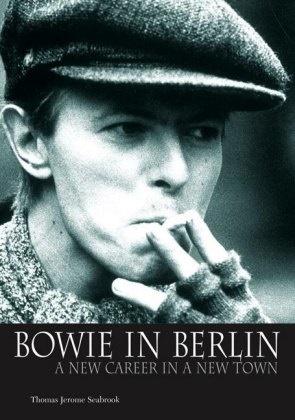Read more
David Bowies legendäre und kreative Jahre in Berlin
David Bowie verbrachte Mitte der 70er drei sehr kreative Jahre seiner Karriere in Berlin. 1975 flieht er aus Los Angeles und ist aufgrund der Drogen, Überarbeitung, Ehestreitigkeiten und seiner paranoiden Beschäftigung mit Okkultismus hart an der Grenze zum Zusammenbruch. Edgar Froese von Tangerine Dream nimmt Bowie in seiner Wohnung in Berlin-Schöneberg auf.
Bowie inspirieren die deutschen Bands Kraftwerk, Neu! und Tangerine Dream. Er zieht bald mit seinem Freund Iggy Pop zusammen und beide genießen die Anonymität und das Nachtleben in der geteilten Stadt. In diesen Jahren gelingen Bowie drei herausragende Alben, die heute als Berliner Trilogie bezeichnet werden: Low, Heroes und Lodger, entstanden unter Mitarbeit so prominenter Mitmusiker wie Brian Eno, Robert Fripp und Tony Visconti. Bowie findet außerdem Zeit für Iggy Pop die Alben The Idiot und Lust for Life zu produzieren. In dem Film Just a Gigolo spielt er eine Hauptrolle.
Dieses Buch präsentiert die Hintergrund-Stories vieler Songs und das Entstehen der teils in den legendären Hansa-Studios aufgenommenen Alben. Bowie war von Berlin fasziniert und sein Genie und seine Freunde haben ihn in dieser Zeit aus einer extremen Lebensphase gerettet.
About the author
Thomas Jerome Seabrook is a writer and editor and this is his first book. He has previously contributed to the Faber Companion To 20th Century Popoular Music (Faber & Faber), Albums; The Stories Behind 50 Years Of Great Recordings, Singles; Six Decades Of Hot Hits And Classic Cuts (both Thunder Bay).
Summary
David Bowie's legendary and creative Years in Berlin
Driven to the brink of madness by cocaine, overwork, marital strife, and a paranoid obsession with the occult, Bowie fled Los Angeles in 1975 and ended up in Berlin, the divided city on the frontline between communist East and capitalist West. There he sought anonymity, taking an apartment in a run-down district with his sometime collaborator Iggy Pop, another refugee from drugs and debauchery, while they explored the city and its notorious nightlife.
In this intensely creative period, Bowie put together three classic albums -- Low, "Heroes", and Lodger -- with collaborators who included Brian Eno, Robert Fripp, and Tony Visconti. He also found time to produce two albums for Iggy Pop--The Idiot and Lust For Life--and to take a leading role in a movie, the ill-starred Just A Gigolo.
Bowie In Berlin examines that period and those records, exploring Bowie's fascination with the city, unearthing his sources of inspiration, detailing his working methods, and teasing out the elusive meanings of the songs. Painstakingly researched and vividly written, the book casts new light on the most creative and influential era in David Bowie's career.

